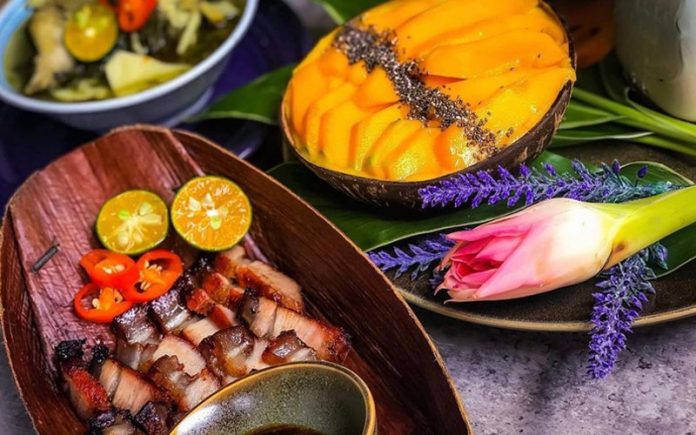
KUCHING: The little cafe looks out of place in that narrow part of Carpenter Street or “Chinatown”, a pretty and modern façade in the row of heritage buildings housing many old Chinese coffee shops, food stalls and Chinese temples.
As you walk in, the two sisters who run the café will welcome you with the Dayak greeting ‘Selamat Datai’. This is Pinggai Cafe, one of the few eateries in town that sell authentic Dayak food.

There is an assurance of freshness, too. Lis Banda and her sister, Cynthia Banda get up in the wee hours of the morning every day, to get to the wet market near their homes.
They are at the market by 4am, to get the best available cuts of meat for their best seller – the Dayak BBQ pork and also fresh chicken for their Manok Pansuh.
Sometimes, they even travel a little bit farther to make sure they get the freshest ingredients.
The sisters, in their 30s, ensure that they only serve authentic Dayak food, the kind served in longhouses during Gawai, with the recipes passed down for generations. Those who know a thing or two about Dayak food will find the menu familiar.
Among other things, Pinggai Cafe, opened two years ago, serves dishes like Manok Pansuh, Dayak-styled slow firewood barbecued pork and Daun Empasak Goreng (stir-fried tapioca leaves).

They also serve tempoyak (fermented durian) dabai fried rice, midin salad, bamboo and coconut shoot chicken as well as the traditional creamy glutinous rice.
Lis said they wanted to prepare and serve meals that taste just the way their grandmother’s and mother’s cooking did. Besides, they want to promote the Dayak-Iban food heritage.
“Our dishes are mostly based on Dayak cuisine, some with a little bit of fusion. This is what has been served in our families, and from every place that we have been to. We tried to recreate them and infuse our own concept, into our dishes.

“We wanted our customers to feel as if they are having a meal back at their kampung or home, cooked by their families despite them being in the state’s capital,” Lis said.
“To maintain the quality and ensure that our food tastes like the original, we go to the market early in the morning or source for ingredients from our own farm.

“Sometimes, we will trek into the woods to source ingredients to make our glutinous rice or pulut,” she said.
Lis said the firewood BBQ pork is a must-have at every Dayak family celebration while the Manok (chicken) Pansuh is a dish prepared by cooking chicken meat in a bamboo stalk, filled with water, seasonings and covered with tapioca leaves.

Lis shared that Pinggai means plate in the language of the Dayak-Iban, the largest community in Sarawak, and their cafe was a reflection of their people.
She added that although they experienced a drop in sales during the MCO period, business quickly picked up when they reopened. “We are glad that our local customers of all races love and enjoy our Dayak food.
“They find it very unique and scrumptious,” she added.


